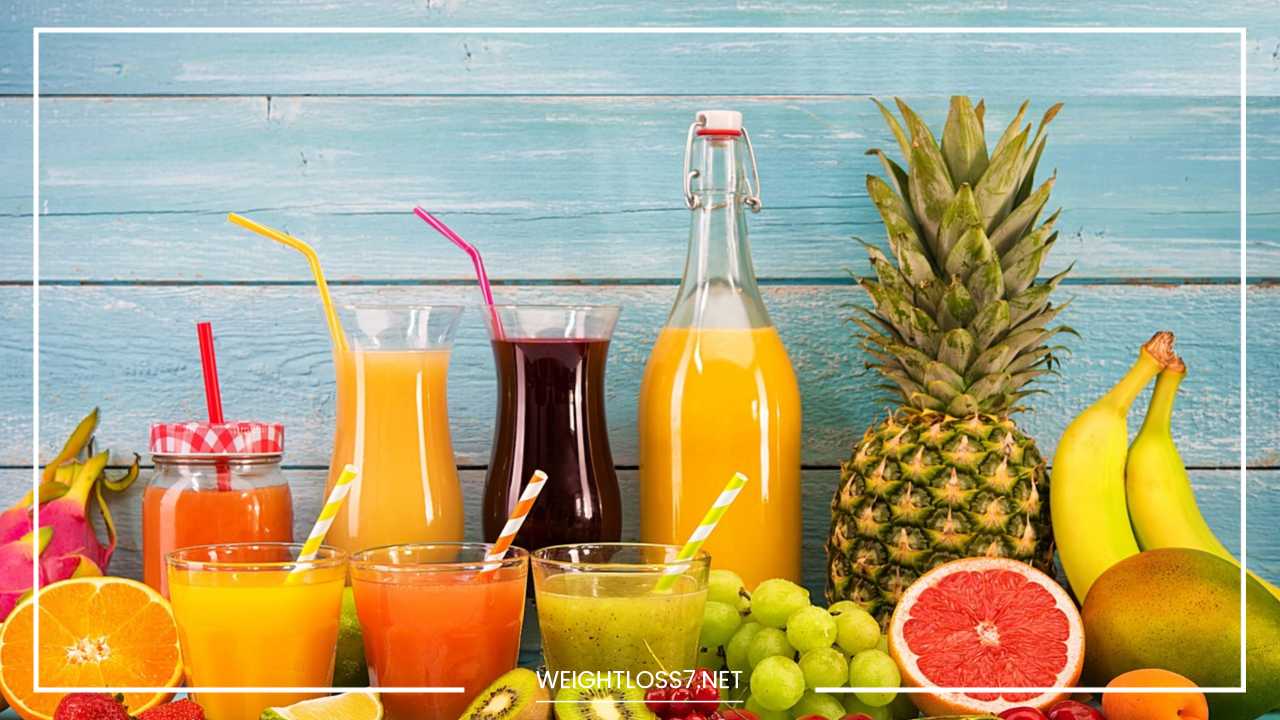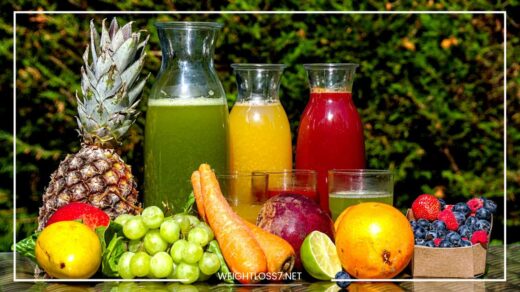Detox Diets: Fact vs. Fad – Unveiling the Truth

Detox Diets
Detox Diets: Unveiling the Fad Behind the Filter
In the age of instant gratification and social media influencers promoting their latest “miracle cleanse,” it’s no surprise that detox diets hold a certain allure.
The promise of shedding pounds quickly, boosting energy levels, and achieving that glowing Instagram-worthy complexion can be highly tempting.
But before you embark on a restrictive detox journey, let’s delve deeper into the science behind these diets and explore healthier alternatives for achieving long-term wellness.
Dissecting the Detox Diet Craze
Detox diets come in a kaleidoscope of variations, but they all share a core principle: short-term dietary restrictions designed to eliminate “toxins” from your body.
These restrictions can range from complete fasting to limiting your intake to specific foods or liquids, often focusing heavily on fruits, vegetables, and juices. Some even incorporate colon cleanses, laxatives, or other supplements to “flush out” the system.
However, the concept of needing a detox diet to cleanse your body is a myth. Our bodies are remarkably well-equipped with their own built-in detoxification systems.
The liver, kidneys, lungs, skin, and digestive system all work tirelessly together to eliminate toxins and waste products. These organs don’t need a special dietary intervention to function; they’re constantly working behind the scenes to keep you healthy.
The Flawed Science of Toxin Removal
Detox diets often focus on eliminating unspecified “toxins,” but this creates a misleading picture. The human body encounters toxins daily, from environmental pollutants to byproducts of our own metabolism.
The good news? Our bodies are designed to handle most of these toxins efficiently. The liver neutralizes them, the kidneys filter them out through urine, and the lungs and skin expel them through sweat.
While some detox diets might promote specific foods or supplements as “detoxifying agents,” there’s little scientific evidence to support these claims.
The Downside of Detox: Potential Risks and Unsustainable Results
While the idea of a quick fix might be appealing, detox diets often come with a hefty price tag – to your health and your wallet. Here’s why:
- Nutrient Deficiencies: Many detox diets are highly restrictive, leading to deficiencies in essential vitamins, minerals, and fiber. This can cause fatigue, weakness, headaches, and even muscle loss. A balanced diet is crucial for optimal health, and these restrictive plans simply don’t provide the necessary nutrients for your body to thrive.
- Unsustainable Weight Loss: Detox diets may lead to rapid weight loss, but this is often due to water loss and muscle breakdown, not actual fat loss. Muscle is metabolically active tissue, meaning it burns calories even at rest. Losing muscle mass can actually slow down your metabolism, making it harder to maintain weight loss in the long run. The weight typically comes back quickly once you resume your normal eating patterns, often with a vengeance.
- Potential Risks: Certain detox diets, especially those involving laxatives or colon cleanses, can disrupt your body’s delicate electrolyte balance. This can lead to dehydration, cramping, and even intestinal damage. In severe cases, these practices can be dangerous and require medical attention.
Building a Foundation for Long-Term Health: Alternatives to Detox Diets
If your goal is to feel your best and empower your body’s natural detoxification process, there are far healthier and more sustainable ways to achieve it:
- Embrace Whole Foods: Make whole, unprocessed foods the cornerstone of your diet. These foods are packed with vitamins, minerals, antioxidants, and fiber – the building blocks of a healthy body. Fruits, vegetables, whole grains, lean protein, and healthy fats should be the focus of your meals and snacks.
- Hydration is Key: Drinking plenty of water is essential for flushing out toxins and keeping your body functioning smoothly. Aim for eight glasses of water per day, but adjust based on your activity level and climate. Water also helps to regulate body temperature, aids digestion, and keeps your skin looking healthy.
- Limit Processed Foods: Processed foods are often loaded with unhealthy fats, added sugars, and sodium. These can hinder your body’s natural detoxification process and contribute to weight gain and other health problems. When you limit processed foods, you’re automatically making healthier choices for your body.
- Manage Stress Effectively: Chronic stress can wreak havoc on your health, including disrupting your body’s natural detoxification processes. Find healthy ways to manage stress, such as exercise, yoga, meditation, or spending time in nature. Prioritizing relaxation techniques will improve your overall well-being.
- Prioritize Quality Sleep: During sleep, your body enters a restorative state, repairing itself, consolidating memories, and removing waste products through the glymphatic system. Aim for seven to eight hours of quality sleep each night. Creating a consistent sleep schedule and practicing good sleep hygiene, such as establishing a relaxing bedtime routine and avoiding screens before bed, can significantly improve your sleep quality and leave you feeling refreshed and energized throughout the day.
- Exercise Regularly: Regular physical activity is a cornerstone of good health. Exercise helps your body eliminate toxins through sweat and improves circulation, which aids in the delivery of nutrients and the removal of waste products. Aim for at least 30 minutes of moderate-intensity exercise most days of the week.
Empowering Your Body’s Natural Detoxification System
Your body is a marvel of self-regulation, and it has a sophisticated system for eliminating toxins. Here’s how you can support these natural processes:
- Support Your Liver: The liver is the body’s primary detoxification organ. You can support its function by limiting alcohol consumption, eating a balanced diet rich in fruits and vegetables, and getting enough sleep.
- Fiber is Your Friend: Fiber helps to move waste products through your digestive system, promoting regularity and preventing toxins from accumulating. Include plenty of fruits, vegetables, and whole grains in your diet for a good fiber intake.
- Beware of Environmental Toxins: While we can’t completely avoid environmental toxins, there are ways to minimize exposure. Choose organic produce when possible, use natural cleaning products, and avoid harsh chemicals in your personal care products.
Making Sustainable Changes for Lasting Results
Detox diets often promote a quick-fix mentality, but true health and wellness are about making sustainable lifestyle changes. Here are some tips for long-term success:
- Focus on Progress, Not Perfection: Don’t get discouraged by occasional slip-ups. The goal is to make healthy choices most of the time. Celebrate your progress, no matter how small, and focus on building healthy habits for the long haul.
- Find an Approach You Enjoy: Sustainable changes are more likely to stick if you find an approach you enjoy. Explore different healthy recipes, find exercise routines you love, and experiment with different stress-management techniques.
- Seek Support: Don’t be afraid to seek support from a registered dietitian, therapist, or a healthcare professional. They can provide guidance, answer your questions, and help you develop a personalized plan for optimal health.
Unveiling the Fad Behind the Filter
Important Note: While this section includes a sample 7-day detox plan, it’s important to remember that detox diets are generally not recommended by healthcare professionals.
This plan is provided for informational purposes only and should not be considered a substitute for professional medical advice.
It’s always best to consult with a doctor or registered dietitian before starting any new diet plan, especially if you have any underlying health conditions.
Sample 7-Day Detoxification Support Plan
Focus: This plan emphasizes whole, unprocessed foods rich in nutrients and fiber to support your body’s natural detoxification processes. It also prioritizes hydration and encourages gentle exercise.
General Guidelines:
- Drink plenty of water throughout the day, aiming for at least eight glasses.
- Limit processed foods, sugary drinks, and unhealthy fats.
- Choose whole grains over refined grains.
- Eat plenty of fruits and vegetables.
- Include lean protein sources in your meals.
- Listen to your body and adjust portion sizes as needed.
- Engage in moderate exercise for at least 30 minutes most days of the week.
Day 1
- Breakfast: Oatmeal with berries and a sprinkle of chia seeds, almond milk
- Lunch: Grilled chicken breast salad with mixed greens, avocado, and a light vinaigrette dressing
- Dinner: Salmon with roasted vegetables (broccoli, asparagus, carrots)
- Snacks: Apple slices with almond butter, carrot sticks with hummus
Day 2
- Breakfast: Smoothie made with spinach, banana, almond milk, and a scoop of protein powder
- Lunch: Lentil soup with a side salad
- Dinner: Turkey chili with brown rice
- Snacks: Handful of almonds and dried cranberries, cucumber slices with a squeeze of lemon
Day 3
- Breakfast: Whole-wheat toast with scrambled eggs and avocado
- Lunch: Quinoa bowl with black beans, chopped vegetables, and a light salsa dressing
- Dinner: Baked cod with roasted sweet potato and steamed green beans
- Snacks: Pear with a dollop of natural Greek yogurt, baby carrots and sugar snap peas
Day 4
- Breakfast: Chia pudding with berries and a drizzle of honey
- Lunch: Chicken or lentil stir-fry with brown rice noodles and mixed vegetables
- Dinner: Vegetarian lentil stew with whole-wheat bread
- Snacks: Cottage cheese with pineapple chunks, celery sticks with peanut butter
Day 5
- Breakfast: Greek yogurt with granola and berries
- Lunch: Tuna salad sandwich on whole-wheat bread with lettuce and tomato
- Dinner: Chicken breast with brown rice and steamed broccoli
- Snacks: Apple slices with cinnamon, handful of mixed nuts
Day 6
- Breakfast: Smoothie made with kale, banana, almond milk, and a scoop of protein powder
- Lunch: Black bean burgers on whole-wheat buns with a side salad
- Dinner: Salmon with roasted Brussels sprouts and quinoa
- Snacks: Edamame pods, sliced bell peppers with hummus
Day 7
- Breakfast: Scrambled eggs with spinach and whole-wheat toast
- Lunch: Chicken Caesar salad with a light dressing (opt for grilled chicken over fried)
- Dinner: Veggie stir-fry with tofu and brown rice
- Snacks: Pear with a slice of cheese, handful of grapes
Remember: This is just a sample plan, and you can adjust it based on your preferences and dietary needs. Be sure to listen to your body and consult with a healthcare professional before starting any new diet plan.
The Takeaway: Embrace a Balanced Approach
Detox diets are often fads that promise more than they deliver. They can be restrictive, unhealthy, and ineffective for long-term weight loss or overall health improvement.
Instead of focusing on quick fixes, focus on nourishing your body with whole foods, staying hydrated, managing stress, getting enough sleep, and incorporating regular exercise into your routine.
These practices will help support your body’s natural detoxification process and promote long-term health and well-being. Remember, taking care of your body is a lifelong journey.
By making healthy choices every day, listening to your body’s needs, and supporting its natural detoxification systems, you can achieve a state of vibrant health and well-being from the inside out.
Detox diets often promote a quick-fix mentality, but true health and wellness are about making sustainable lifestyle changes. Focus on nourishing your body with whole foods, staying hydrated, managing stress, getting enough sleep, and incorporating regular exercise into your routine.
These practices will help support your body’s natural detoxification process and promote long-term health and well-being. Remember, taking care of your body is a lifelong journey.
By making healthy choices every day, listening to your body’s needs, and supporting its natural detoxification systems, you can achieve a state of vibrant health and well-being from the inside out.

















